Probiotic formula reduced symptoms of colic in recent study
AB-Biotics' AB-Kolicare is composed of a mix of Bifidobacterium longum CECT7894 (KABP042) and Pediococcus pentosaceus CECT8330 (KABP041).
Photo © stock.adobe.com/ucchie79

A recent study1 found that supplementation with AB-Biotics’ (Barcelona, Spain) probiotic formula called AB-Kolicare significantly improved symptoms of colic in infants. In the randomized, double-blind, placebo-controlled study, 112 exclusively breastfed and mixed fed infants less than two months of age received either placebo or the probiotic formula daily for 21 days. AB-Kolicare is composed of a mix of Bifidobacterium longum CECT7894 (KABP042) and Pediococcus pentosaceus CECT8330 (KABP041) at 1 × 109 colony forming units. Results showed that, compared to placebo, infants taking the probiotic formula has significantly shorter crying time at days seven (38 minutes/day vs. 62 minutes/day), 14 (20 minutes/day vs. 50 minutes/day), and 21 (14 minutes/day vs. 40 minutes/day), as well as improved stool consistency on day 21.
“Colic can be an extremely distressing experience, for both babies and their families,” said Jordi Riera, chief business development officer for AB-Biotics, in a press release. “Emerging research shows that babies with infant colic have a different microbiota composition than those without. For instance, the presence of Bifidobacterium – beneficial bacteria that digest dietary fiber, help to prevent infection, and produce vitamins – is just 0.3% in colic babies, compared to 10% in non-colic infants. This suggests that gut microbiota may play an important role in the development of the condition and explains why probiotics are being explored as a potential treatment due to their gut-strengthening properties. In this study, the probiotic solution contained a strain of B. longum, which is a Human Resident Bifidobacteria (HRB) and one of the most common Bifidobacteria in healthy infants. This is significant since most other probiotic solutions for infants contain non-HRB such as B. animalis.”
Reference
- Chen K et al. “Infantile colic treated with Bifidobacterium longum CECT7894 and Pediococcus pentosaceusCECT8330: a randomized, double-blind, placebo-controlled trial.” Frontiers in Pediatrics, Published online ahead of print on September 10, 2021
Celebrating International Women's Day: Highlighting research on women's health and wellness, Part II
Published: March 7th 2025 | Updated: March 7th 2025To celebrate International Women's Day (March 8), Nutritional Outlook is putting the spotlight on women's health and wellness. In this compilation, we present recent research on pregnancy and menopause.
Celebrating International Women's Day: Highlighting research on women's health and wellness, part I
March 6th 2025To celebrate International Women's Day (March 8), Nutritional Outlook is putting the spotlight on women's health and wellness. In this compilation, we present recent research on menstruation and skin health.





